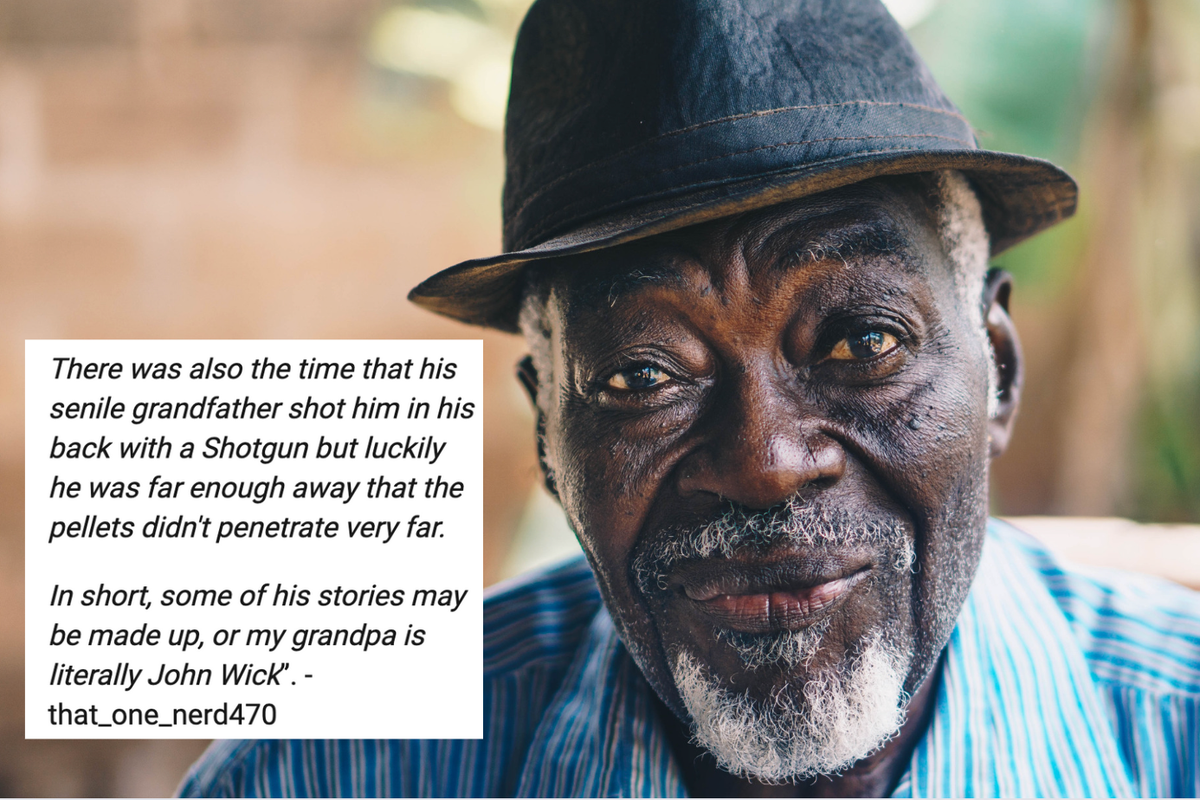People share unforgettable stories told by their grandparents, and some are just insane
These grandparents truly lived.

When your grandpa's a BAMF.
It can be eye-opening to listen to stories told by our grandparents. For many of us, that might be the only connection we have to them.
Even the smallest glimpse into their former lives gives us insight–not only into their own personal history, but into the soul of a different era entirely. Of course, whether that inspires nostalgia or disgust depends on the story.
I, for instance, know next-to-nothing about my maternal grandfather, other than he used his job at a candy factory to cover the fact that he was in cahoots with an Asian mob. An odd thing to know about your grandfather, and I’ll never look at M&M’s the same way again.
A Reddit user named LorieEve recently asked people to share stories from their own grandparents that they’d “never forget.” Some answers are short and simple. Others read like a sprawling novel. Some are hilarious; others heartbreaking. All offer a meaningful look into the past.
Here are 10 of the best responses:
1.
“My grandfather was one of the earliest people to receive penicillin. His GP freaked out when he had a handwritten note from Alexander Fleming.” – melodicmusical
2.
"My grandpa worked in a steel mill in Ohio during the 50s and 60s and he was robbed at gunpoint in the basement of said mill when he looked him in the eyes and said ‘nice gun, but mine’s bigger’ needless to say he was not robbed.
He was also launched out of a third story window and landed in a dumpster from a propane explosion. He had suffered 3rd degree burns and drove the other 3 people involved to the hospital where they received proper care. His scars are covered by his beard.
He was also involved in a helicopter crash that destroyed his back so he can no longer sit down very well. He also survived an airplane crash in the 50s when 3 out of the 4 engines lost power and caught fire. It was a military aircraft that had been repurposed after the war.
In the 60s he was involved in a car accident caused by 2 people who had just robbed a bank. He then helped the police chase them down in his partially destroyed car because he wanted insurance information.
There was also the time that his senile grandfather shot him in his back with a shotgun but luckily he was far enough away that the pellets didn't penetrate very far.
In short, some of his stories may be made up, or my he's literally John Wick.” – that_one_nerd470
3.
“My grandmother's brother was drafted in the Army and was sent to fight in the Korean War. He ended up in the 2nd Infantry Division. His division was caught in The Gauntlet and he didn’t make it back home. To this day, he is still unaccounted for.
Well, the day he left home the last time, my grandma went with him to the train station. She told me that the last thing he ever said to her was, ‘at least I made it back home for a home cooked meal before I left.’
She was probably well into her 70s when she told me that story. It still brought tears to her eyes.” – slider728
4.
“My grandparents and all my relatives of that generation fled Germany after my great-grandfather was taken to a work camp.
My grandmother's most haunting story:
She was about 14, walking with a boy in their town square. She had blonde hair and would definitely 'pass' for Aryan. He apparently fit what the SS thought of as a Jew (he may have been wearing a yarmulke or other garment, I never knew that part.) The officers stopped them and grabbed him, told him to stay away from Aryan girls. He tried to say something, but didn't get to before they handcuffed him and dragged him away. They wished my grandmother goodnight and she never saw him again.” – DTownForever
5.
“My grandmother's family fled for their lives from Austria to the USA. Her father had been an outspoken political opponent of Adolf Hitler, and helped organize an anti-Nazi resistance in his hometown. Then Hitler invaded Austria, and somebody was kind enough to tip my great-grandpa off that his name was on a list to get shipped off to the concentration camps.
My grandmother barely remembered Austria or the move to New York City. But she never forgot a year or so later walking into a store with her father one day, only to have the shopkeeper curse him out and refuse to serve him as soon as he opened his mouth and spoke with a German accent. That incident made a deep impression on her. She credited it with teaching her quickly…just how shitty prejudice can be, especially in times of war.
She never taught any of her children her native language. An enormous number of German-Americans lost or refused to pass on their heritage language during WWII, because that wasn't a great time to be visibly German in any way in the USA.” – hononononnoh6.
“My grandfather was a kid during the Great Depression. He once told me they had raccoon one year for a special Christmas dinner.” – FlokiTrainer
7.
“This one's more lighthearted than most.
Both of my grandparents grew up in South Africa, and dated throughout high school. Just as they're getting ready to graduate, Ouma's father decided to move the whole family to the US. Totally heartbroken, Ouma broke up with Oupa a week before the departure, then spent the next few days bawling her eyes out in between packing. To her surprise Oupa had 'taken the news way too well'.
On the day of the departure Ouma and her family arrive to find Oupa waiting on the dock for them. Ouma figured he was there to see them off, until she realizes that the suitcases all around his feet are his. And when he went to greet them he was holding a letter from his parents for her parents, a ticket for their ship, and an engagement ring. Turns out that man had looked so calm during the breakup because he'd already been planning on going across the ocean for her.
They're up in their eighties and still together now.” – Anxious_Cap518.
“When my grandpa was 9 ish him and his friends were playing by the train tracks as people in their generation did. Him and his friends convinced a 4 year old who was playing with them at the time to get on a random train carriage where they then closed the door and told him he was going to Blackpool, he tried to frantically unlock the door but was too small to reach the lock.
He recalls watching this little boy's face as the train pulled off from the station.
After an hour the boy's mother asked them all where her son was where they just said ‘oh he's off to Blackpool.’ Luckily at the next train station a train conductor found the little boy and took him back on the next train.” – Remarkable-Ad-11079.
“My grandfather was quite the badass when he was younger, lots of stories I remember from him, but I’ve gotta share this story:
Context, I’m a second gen Canadian which makes my grandparents the ones who immigrated. They immigrated from the Netherlands, which is popular for their culture, food, and of course beer.
When he immigrated to Canada, he knew some English but not much...There was a man who greeted my grandfather which I don’t remember how or when, but regardless, they got to talking and the man asked my grandfather to ‘go for a beer’. And in Holland when you're asked to go for a beer, it means go to the bar and go get a beer.
Note this was the late 60’s in Canada, and A&W was beginning to be popular. My grandfather of course agrees, to get to know more people around where he was going to live. The man brings my grandfather to A&W, for a root beer and a burger, so he was confused out of his mind not being able to speak a word of English in this new country, and trying to learn the culture. My grandfather then learned he hated root beer. He still has contact with the A&W man.” – I-am-johan10.
“My grandfather was a veteran of WWII, and one of the toughest but kindest people I ever had the honor of knowing.
One story from his military service he enjoyed sharing was his issues with driving on base. He was pulling up to his DI’s office, and went for a soft brake and park. Instead, due to how close the brake and gas pedals were in the truck he was driving, he hit the gas, and crashed into his DI’s office, stopping right at his desk.
While his DI stood there in shock and likely anger, my grandfather got out of the truck and just said hi. To which his DI responded ‘Hi? HI?! WHAT IS THE MATTER WITH YOU?!’
I miss my grandfather every day, and if there is a heaven, I hope he’s staying away from those trucks.” – SuburbanDJThis article originally appeared two years ago.
- Men share ridiculous ways their masculinity was questioned ... ›
- Gay men gave straight guys relationship advice and they'd be dumb ... ›
- One person has crowdsourced the very best life advice from over 20 ... ›
- A grandma shares solution for grandparents who buy too many gifts - Upworthy ›
- Harvard grad dispels the biggest misconceptions about the gay 'accent' - Upworthy ›
- Woman discovers her grandpa meticulously documented every date with his wife for over 60 years - Upworthy ›






 A UPS truck with package deliveries.Image via Wikipedia
A UPS truck with package deliveries.Image via Wikipedia
 Cher was the biggest phenomenon on the planet for the better part of the '70s and '80s.Casblanca Records/
Cher was the biggest phenomenon on the planet for the better part of the '70s and '80s.Casblanca Records/

 A high school volunteer with her senior "tandem."
A high school volunteer with her senior "tandem."  KH2 makes leaving the house more accessible to senior citizens.
KH2 makes leaving the house more accessible to senior citizens.  Many "culture buddies" stay in contact after the program ends.
Many "culture buddies" stay in contact after the program ends.  KH2 provides students with excellent life skills and lasting connections.
KH2 provides students with excellent life skills and lasting connections. 
 Parents posing with their young kids on a basketball court. via
Parents posing with their young kids on a basketball court. via